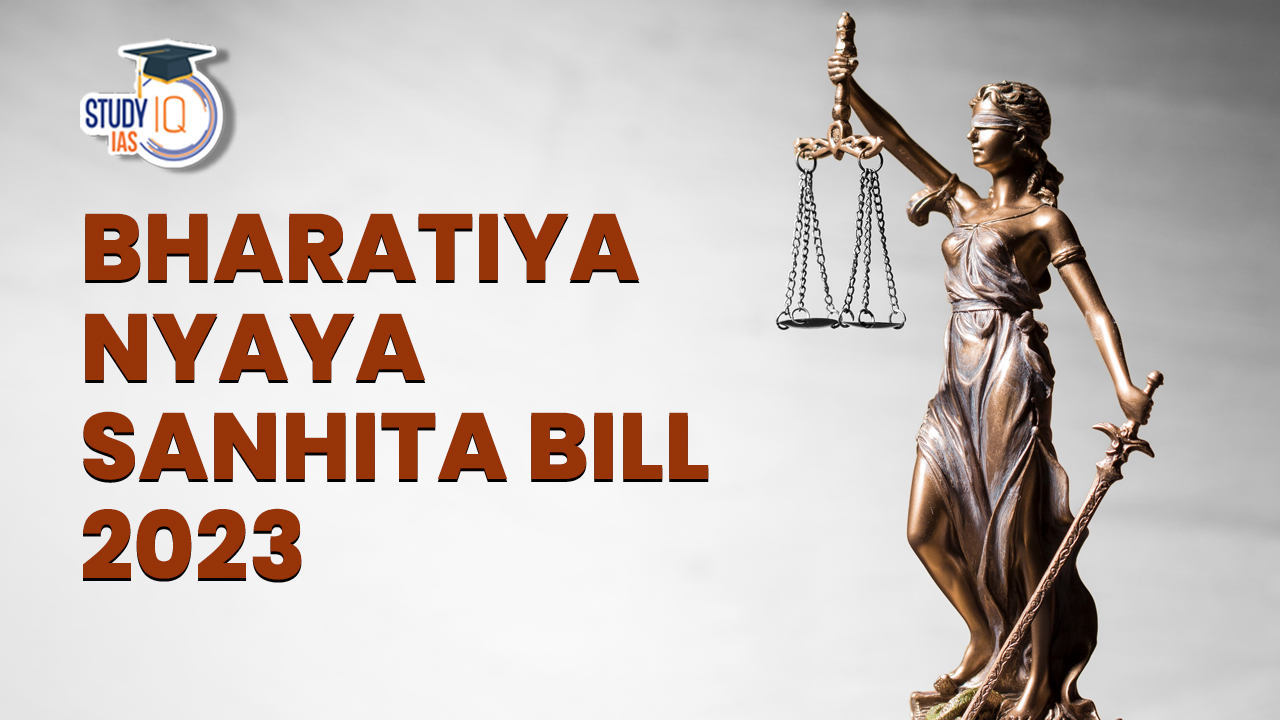Table of Contents
After heated debates and careful consideration, the Lok Sabha on the 20th December 2023 (thirteenth day of the winter session) passed three crucial criminal law bills:
- The Bharatiya Nyaya (Second) Sanhita, aiming to modernize the Indian Penal Code,
- The Bharatiya Nagarik Suraksha (Second) Sanhita, advocating for a revamped Code of Criminal Procedure, and
- The Bharatiya Sakshya (Second) Sanhita which aims to replace the Indian Evidence Act.
We’re now on WhatsApp. Click to Join
Bharatiya Nyaya Sanhita Bill 2023
In a landmark move towards reforming India’s legal and judicial landscape, the government has introduced the Bharatiya Nyaya Sanhita Bill 2023. This bill aims to bring about a comprehensive transformation in the way justice is administered, ensuring greater efficiency, transparency, and accessibility for all citizens. The key highlights of this Bharatiya Nyaya Sanhita Bill 2023 are poised to reshape the Indian judicial system, making it more responsive to the needs of the people and aligning it with the demands of the modern world.
Bharatiya Nyaya Sanhita Bill Background
In 2020, the Ministry of Home Affairs established a committee led by Prof. (Dr.) Ranbir Singh, former Vice Chancellor of National Law University (NLU), Delhi. This committee was tasked with reviewing the three codes of criminal law. The primary objective of the committee was to propose comprehensive reforms to the country’s criminal laws in a manner that is both principled and effective.
- The committee’s focus was on ensuring the safety and security of individuals, communities, and the nation as a whole.
- Throughout its deliberations, the committee aimed to uphold constitutional values such as justice, dignity, and the intrinsic value of each individual.
- Their goal was to recommend amendments to the criminal laws that align with these values and priorities.
- Subsequently, in February, the committee successfully submitted its recommendations regarding amendments to the criminal law.
- These recommendations are intended to serve as a foundation for enhancing the current legal framework, promoting safety and security, and upholding the constitutional principles of justice, dignity, and the inherent worth of every individual.
Bharatiya Nyaya Sanhita Bill 2023 in Details
The initial draft of the Indian Penal Code (IPC) was composed by the inaugural Law Commission, presided over by Thomas Babington Macaulay, in the year 1834. Its enactment was formalized in January 1860, signifying the establishment of a comprehensive legal framework to address various criminal offences.
- Fast forwarding to the year 2023, a significant legislative development emerges in the form of the Bharatiya Nyaya Sanhita (BNS) Bill.
- This legislative proposition holds the intention to not only revoke but also supplant the IPC, presenting a substantial overhaul of India’s criminal legal architecture.
- The BNS Bill introduces a spectrum of revisions to the existing legal clauses, particularly concerning domains such as defamation, offences against women, and acts related to attempted suicide.
- A distinct divergence between the two legal codes arises in their extent and purview. Whereas the Indian Penal Code comprises a total of 511 sections, the Bharatiya Nyaya Sanhita Bill encompasses a consolidated count of 356 provisions.
- This streamlined approach suggests a reshaped and potentially more targeted legal framework, designed to ensure a more effective and streamlined dispensation of justice.
In summation, the emergence of the Bharatiya Nyaya Sanhita Bill in the year 2023 signifies a substantial stride towards contemporizing and adapting India’s criminal legal structure to the modern requisites and societal values of the nation. The proposed revisions and amalgamations within the BNS Bill underscore an evolution in legal thought while addressing pivotal societal issues, thus rendering it a momentous undertaking in the realm of legal transformation.
Bharatiya Nyaya Sanhita Bill 2023 Objectives
Bharatiya Nyaya Sanhita (BNS) Bill
The BNS Bill introduces new categories of offences like cybercrimes, terrorism, hate crimes, honour crimes, mob lynching, etc. It offers special provisions for protecting women, children, senior citizens, and other vulnerable sections of society.
Bharatiya Nagarik Suraksha Sanhita (BNSS) Bill
The BNSS Bill aims to safeguard the rights and interests of victims, witnesses, and accused individuals within the criminal justice system. It focuses on expeditious and equitable trials, efficient investigation and prosecution, alternative dispute resolution mechanisms, victim compensation and rehabilitation schemes, and witness protection programs.
Bharatiya Sakshya (BS) Bill
The BS Bill seeks to integrate scientific and technological advancements in evidence collection and analysis, encompassing methods such as DNA testing, narco-analysis, brain mapping, etc. It establishes guidelines for the admissibility and relevance of evidence, addresses the burden and standard of proof, and establishes principles of presumption of innocence and guilt.
Bharatiya Nyaya Sanhita Bill 2023 Provisions
The Bharatiya Nyaya Sanhita Bill, 2023, is a landmark legislative initiative that aims to bring significant reforms to India’s legal framework. By introducing key amendments and provisions, the bill seeks to enhance the efficiency, fairness, and accountability of the justice system. Here are the key highlights of the bill:
Sedition Revisited
Under the Indian Penal Code (IPC), Section 124-A deals with the offence of sedition, carrying a sentence of life imprisonment or up to three years with a fine. In the BNS Bill, provision 150 focuses on acts endangering India’s sovereignty, unity, and integrity. This revised provision emphasizes the gravity of acts against the state and strengthens measures to safeguard the nation’s interests.
Defining Terrorism
For the first time, the BNS Bill introduces a comprehensive definition of terrorism. It characterizes a terrorist as an individual who commits acts within India or abroad to threaten national unity, integrity, security, or to intimidate the public or disturb public order. This new definition enhances clarity and precision in identifying and addressing acts of terrorism.
Redefining Defamation
The bill redefines the offence of defamation, altering the associated penalties. Under the BNS Bill, defamation carries a maximum sentence of two years’ imprisonment, a fine, or community service. This reform emphasizes a balanced approach to protecting reputation while promoting proportionate punishment.
Combating Mob Lynching
A significant addition to the bill is the introduction of capital punishment for the offence of mob lynching. Offenders can now face capital punishment or a prison term of seven years to life. This stern approach underscores the government’s commitment to curb mob violence and protect the safety and dignity of citizens.
Strengthening Women’s Rights
The BNS Bill recognizes the need to safeguard women from exploitation under false pretences such as marriage, job offers, or promotions. Such exploitation is now criminalized, reflecting a progressive stance toward women’s rights and protection.
Adultery Decriminalized
In alignment with a Supreme Court ruling, the BNS Bill decriminalizes adultery by omitting the provision for this offence. The change reflects a modern and rights-based perspective on personal relationships and individual autonomy.
Inclusivity in Unnatural Sexual Offences
The bill aligns with the Supreme Court‘s stance on LGBTQ+ rights by excluding punishment for unnatural sexual offences between consenting adults. This modification reflects a more inclusive and tolerant approach to personal choices and relationships.
Marital Rape Exception
Despite various debates on the issue, the BNS Bill retains an exception to marital rape, similar to the previous legal framework. The bill continues to generate discussions around the need for comprehensive reform in addressing this sensitive matter.
Streamlined Legal Procedures
To expedite the judicial process, the BNS Bill introduces time-bound procedures. A chargesheet must be filed within 90 days, with an additional 90 days permissible by court order. The investigation period is capped at 180 days, followed by a 30-day window for delivering a judgment after trial. These provisions emphasize the importance of swift justice delivery.
Murder Punishment and Procedure
While the BNS Bill retains the punishment for murder as life imprisonment or death sentence, it reassigns the provision under section 101. This amendment does not alter the existing penalties but aims to streamline legal provisions for murder cases.
In conclusion, the Bharatiya Nyaya Sanhita Bill, 2023, marks a significant step toward revamping India’s legal landscape. By addressing critical issues such as sedition, terrorism, mob lynching, women’s rights, and streamlined legal procedures, the bill aims to create a fair, just, and modern legal framework that reflects the evolving needs of Indian society. As the bill progresses through the legislative process, it opens doors for constructive dialogue and engagement to ensure a balanced and effective legal system for all citizens.
Bharatiya Nyaya Sanhita Bill 2023 Anticipated Results
The proposed Bharatiya Nyaya Sanhita bills are poised to initiate a profound shift away from punitive and retributive practices within the realm of criminal justice, embracing instead a restorative and rehabilitative approach. This transformation will be underpinned by a foundation of human rights, honouring the dignity and entitlements of all participants involved in the criminal justice continuum.
Furthermore, the bills are anticipated to bolster the efficiency and efficacy of the criminal justice framework by diminishing delays, reducing caseloads, eliminating backlogs, and combating corrupt practices. Through measures aimed at ensuring transparency, fostering accountability, and upholding professionalism, these bills will contribute to an elevated standard of justice administration and its credibility.
By preempting and containing crimes that undermine societal harmony and order, the bills will actively cultivate an environment of tranquillity and concord. Delving to the core of criminal behaviour, they will confront the societal disparities and injustices that often underlie criminal acts, thereby addressing the very roots of criminality.
In bolstering constitutional values and principles, the bills will not only fortify the rule of law but also augment democracy within India. Collectively, these legislative endeavours herald a comprehensive and transformative approach to the criminal justice system, promising far-reaching benefits for the nation’s legal and social landscape.
Bharatiya Nyaya Sanhita Bill 2023 Challenges
Navigating the landscape of legislative change presents a range of challenges that demand careful consideration and strategic approaches. These challenges encompass not only potential opposition and resistance but also legal complexities, practical hurdles, and the need to anticipate unforeseen consequences. To surmount these challenges and forge a successful path forward, a comprehensive strategy is imperative.
Addressing Apprehensions and Garnering Support
The introduction of these bills may understandably trigger concerns among diverse stakeholders who might perceive them as impinging on their rights, interests, or autonomy. In order to create an environment conducive to progress, it is essential to proactively engage with these concerns. This entails open dialogues, clear communication of the bills’ intentions, and fostering consensus through constructive engagement. By addressing apprehensions and showcasing the benefits of the proposed changes, the groundwork for broad-based support can be laid.
Ensuring Robust Legislative Passage
To ensure the success of these bills, a multi-pronged approach is needed. Garnering support and consensus among both houses of Parliament is pivotal. This requires comprehensive outreach to lawmakers, highlighting the bills’ merits, and seeking cross-party backing. Additionally, it is crucial to ensure that the integrity and intent of the bills remain intact throughout the legislative process. Vigilance against dilution or undue delays is paramount for their effective passage.
Implementing Phased and Time-Bound Execution
The transition from legislative approval to on-ground implementation can often be a complex endeavour. Challenges may arise from limited awareness, coordination gaps among diverse stakeholders, or a lack of cooperation among various agencies. To address these, a phased and time-bound implementation strategy should be adopted. This strategy would include targeted awareness campaigns, inter-agency coordination, and stakeholder involvement to ensure a smooth rollout and prevent bottlenecks.
Adapting to Unforeseen Consequences
Change, especially at the legislative level, can bring about unforeseen consequences or implications. These might necessitate subsequent amendments or modifications to the bills. To effectively handle such scenarios, a proactive approach to ongoing evaluation is crucial. Instituting periodic assessments and reviews can help identify any emerging gaps or glitches and enable swift corrective action. This iterative approach ensures that the legislation remains responsive to evolving realities.
In conclusion, the journey of transforming bills into effective legislation is riddled with challenges, but each challenge can be transformed into an opportunity for growth. By addressing stakeholder concerns, securing legislative support, strategizing implementation, and proactively addressing unforeseen consequences, a pathway to success can be charted. Through these concerted efforts, the bills can not only overcome obstacles but also flourish as instruments of positive change.
Bharatiya Nyaya Sanhita Bill 2023 UPSC
Bharatiya Nyaya Sanhita Bill 2023 is an important topic for the UPSC exam that is covered under General Studies Paper 2 Indian Polity section and is also relevant for the UPSC Prelims exam. It is hoped that because the measure has been sent to a parliamentary standing committee, steps will be done to reduce ambiguity and loose definitions and to make the bill more in line with societal developments and the introduction of new technology.


 NITI Aayog Report on India’s Hand and ...
NITI Aayog Report on India’s Hand and ...
 9th Schedule of Indian Constitution: His...
9th Schedule of Indian Constitution: His...
 NCERT Books for UPSC Preparation, Check ...
NCERT Books for UPSC Preparation, Check ...





















